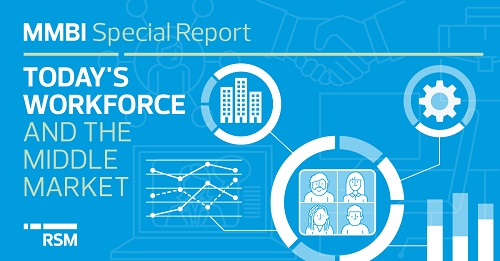Three years after the start of the pandemic, remote work is becoming a permanent fixture among American middle market businesses, according to the RSM US Middle Market Business Index (MMBI) Workforce Special Report, released by RSM US LLP in partnership with the U.S. Chamber of Commerce.
The report shares findings from a set of questions about the workplace and hiring that were included in RSM’s quarterly MMBI survey, and the results reflect a dramatic shift in the way midsize businesses operate, affecting everything from operations to recruitment and culture.
In the fourth quarter of 2022, one-third of middle market executives reported having employees working remotely because of COVID-19 who were not doing so before the pandemic. This figure is only slightly below the 36 percent who responded similarly to the same question a year earlier when COVID-19 infections were higher. Of those businesses that have employees working remotely, nearly three-quarters (74 percent) allow for hybrid work, while more than half (54 percent) provide an option to work off site all the time.
“American workers experienced profound shocks during the pandemic, and that altered their preferences and behavior,” said Joe Brusuelas, chief economist with RSM US LLP. “As a result, firms are choosing to accommodate employees in order to retain their workers and recruit new ones. It’s clear that if middle market firms want to remain competitive, they will have to make concessions and adjustments that only five years ago would have been hard to imagine.”
In a tight labor market with job openings near all-time highs, employers are accommodating workers’ demands for flexibility, which the survey found has not been particularly damaging to firms. In fact, when asked about the impact that remote or hybrid work is having on their business’s culture, 39 percent of executives said it had a positive impact. That view was especially pronounced among larger middle market firms ($50 million to $1 billion in annual revenue), with 55 percent of executives citing a positive outcome on the firm’s culture.
The survey also found that larger middle market companies have been able to better handle the transition to remote and hybrid work, from a technological and human resources standpoint. In one example, nearly half (48 percent) of the respondents said they were hosting remote networking events or considering it. When segmented by firm size, this figure rose to 53 percent for larger companies and declined to 46 percent for smaller middle-market businesses.
Additionally, when asked if their companies have the technology and tools for online mentoring, 66 percent of larger firms said they did, compared to 41 percent of smaller middle market firms.
Remote work trends are evolving as hiring, even with the prospect of a possible recession, remains robust. More than half of the executives surveyed (51 percent) said their hiring needs over the next year would be significantly to moderately higher. While that figure has moderated compared to a year earlier, it remains high.
More than half (52 percent) of the survey respondents said they are sourcing talent for work that can be done remotely from a broader geographical area than before COVID-19. This is up from the 49 percent of executives who responded similarly to the same question a year earlier.
The survey also revealed challenges firms face as they adapt to changing workforce dynamics. More than two-thirds (69 percent) of middle market firms that have employees working outside the office said that remote and hybrid work had impeded employee training and development, up from 64 percent a year ago. Additionally, 66 percent of middle market firms that currently have employees working remotely said that remote work has created challenges for onboarding or orienting new employees.
For more information, visit rsmus.com.









